The demand for aortic endografts in Japan is valued at USD 165.4 million in 2025 and is projected to reach USD 237.3 million by 2035, reflecting a compound annual growth rate (CAGR) of 3.7%. This growth is primarily driven by the increasing prevalence of aortic diseases, such as aneurysms, and the rising number of procedures requiring endografts for treatment. As Japan’s population continues to age, demand for medical devices such as aortic endografts, which offer minimally invasive solutions for aortic repairs, is expected to grow. Additionally, advancements in endograft technology, including improved materials and delivery systems, are driving broader adoption of these devices in clinical practice.
The market for aortic endografts in Japan is expected to grow steadily over the forecast period. The demand rises incrementally from USD 138.1 million in earlier years to USD 165.4 million in 2025, continuing to grow through USD 171.5 million, USD 177.8 million, and ultimately reaching USD 237.3 million by 2035. The consistent year-on-year growth reflects both the aging population and the increasing adoption of less invasive, more effective treatment options for aortic diseases. This steady growth trend indicates that while the market is maturing, the demand for aortic endografts will continue to be driven by medical advancements and the rising need for cardiovascular interventions.
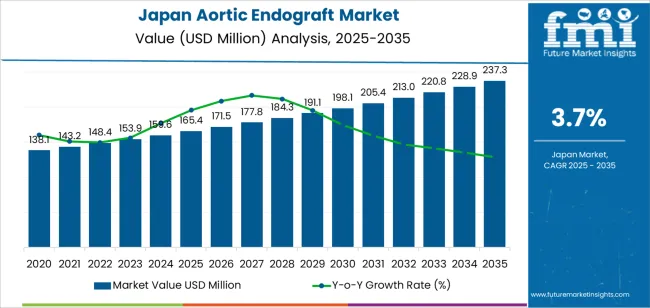
Demand in Japan for aortic endografts is projected to increase from USD 165.4 million in 2025 to USD 237.3 million by 2035, reflecting a compound annual growth rate (CAGR) of approximately 3.7%. Starting from USD 138.1 million in 2020, demand rises steadily to USD 165.4 million by 2025. Between 2025 and 2030, the value climbs through USD 184.3 million and beyond. Growth is supported by the ageing population in Japan, rising incidence of aortic aneurysms and dissections, and increasing adoption of endovascular repair procedures over open surgery. Enhanced awareness of minimally invasive therapies and wider hospital capability for these interventions contribute to demand expansion.
Over the decade to 2035, the role of product innovation and procedural evolution will increasingly enhance value. Early growth is more volume driven as more patients become eligible for endovascular treatments and more institutions adopt the technology. As the installed base matures, the value growth will shift toward higher complexity cases, advanced graft technologies (branched and fenestrated grafts), and upgrades of older systems thus increasing average selling value per case. This shift supports sustained growth beyond simple volume gains and underpins the projected increase to USD 237.3 million by 2035.
| Metric | Value |
|---|---|
| Industry Value (2025) | USD 165.4 million |
| Forecast Value (2035) | USD 237.3 million |
| Forecast CAGR (2025 to 2035) | 3.7% |
The demand for aortic endograft in Japan is influenced by the country’s significant elderly population and higher prevalence of aortic aneurysms and related vascular conditions. As these conditions become more frequently diagnosed, healthcare providers in Japan are increasingly adopting endovascular repair techniques instead of traditional open surgery approaches. This shift supports the role of devices such as the Aortic Endograft which allow less invasive aneurysm repair. Hospitals and specialised cardiovascular centres in Japan are expanding capacity for endovascular procedures, which in turn drives demand for these grafts.
Another factor is the policy and clinical environment in Japan that supports early diagnosis and minimally invasive interventions. Japanese medical centres are equipped with imaging, vascular access and hybrid operating rooms, enabling broader use of endografts in both thoracic and abdominal aortic repair. At the same time, reimbursement pressures, high device cost and strict regulatory requirements moderate expansion. Nevertheless, the demand for aortic endograft in Japan continues to grow as treatment standards evolve toward less invasive care and providers replace older surgical grafts with modern endovascular alternatives.
The demand for aortic endografts in Japan is driven by the types of products and the medical procedures for which they are used. The primary product types are abdominal aortic grafts and thoracic aortic grafts, each tailored to address different parts of the aorta affected by aneurysms or other vascular conditions. Procedures using aortic endografts include endovascular aneurysm repair (EVAR) and open surgical repair. These segments reflect the growing prevalence of aortic aneurysms, particularly among Japan's aging population, and the shift toward minimally invasive techniques, which increase the demand for specialized endografts.
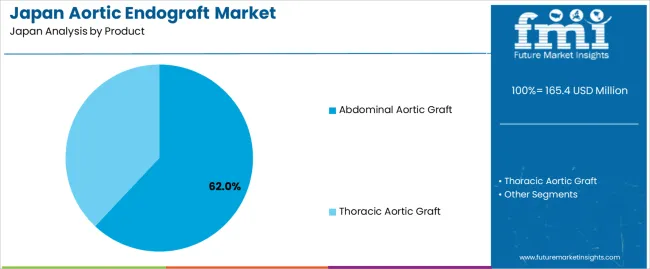
Abdominal aortic grafts account for 62% of the total demand for aortic endografts in Japan. This high demand is largely driven by the prevalence of abdominal aortic aneurysms (AAA), which are more common in the population, especially among elderly individuals. Abdominal aortic grafts are used to treat aneurysms in the abdominal section of the aorta, and their demand is growing as awareness of AAA increases, along with the aging population. The procedure involving abdominal grafts is also less invasive, contributing to quicker recovery times, which is appealing to both patients and surgeons.
The demand for abdominal aortic grafts is also supported by the continued preference for endovascular aneurysm repair (EVAR), a minimally invasive procedure that involves placing a graft via small incisions, offering reduced risk compared to open surgical repair. As Japan's healthcare system increasingly adopts EVAR for treating AAA, the demand for abdominal aortic grafts is expected to rise due to their proven efficacy and lower complication rates, further solidifying their position in the market.
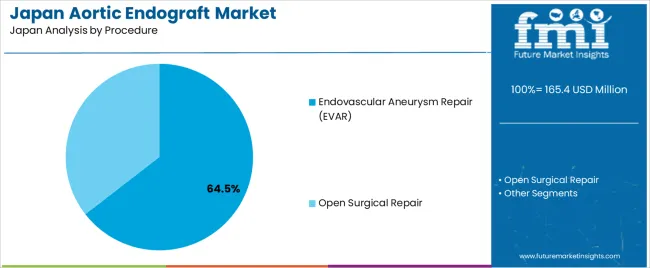
Endovascular aneurysm repair (EVAR) accounts for 64.5% of the total procedures using aortic endografts in Japan. EVAR is a minimally invasive procedure that involves inserting a graft through small incisions, making it a preferred method over open surgical repair. The growing demand for EVAR is driven by its ability to reduce recovery time, lower risk of complications, and provide a less traumatic experience for patients. With Japan's aging population, there is an increasing number of individuals diagnosed with aortic aneurysms, contributing to the rise in EVAR procedures.
The shift toward minimally invasive procedures like EVAR is also fueled by advancements in endograft technology, which have improved the precision, reliability, and safety of the procedure. As the healthcare system in Japan continues to prioritize less invasive treatments for better patient outcomes, EVAR will remain the dominant procedure for treating aortic aneurysms. The adoption of EVAR is expected to increase further, ensuring continued growth in the demand for abdominal aortic grafts used in these procedures.
The demand for aortic endografts in Japan is primarily driven by the increasing prevalence of aortic aneurysms, particularly abdominal aortic aneurysms (AAA) and thoracic aortic aneurysms (TAA). As Japan’s population ages, the incidence of these conditions rises, creating a need for effective treatment options. Endovascular repair using aortic endografts offers a less invasive alternative to traditional open surgery, providing faster recovery times and lower complication rates. The Japanese healthcare system’s focus on minimally invasive procedures is also contributing to increased adoption of endografts for aortic repair.
Japan's ageing population is a significant factor driving the demand for aortic endografts. As the number of elderly individuals increases, the risk of aortic aneurysms, particularly in those over the age of 65, also rises. The preference for less invasive procedures, such as endovascular repair, over traditional open surgery is becoming more prominent in the country’s healthcare settings. This demographic shift is expected to continue growing, resulting in higher demand for aortic endografts, particularly in hospitals and specialized treatment centers dealing with vascular diseases.
An opportunity for expanding the use of aortic endografts in Japan lies in improving access to these procedures in smaller hospitals and rural areas. As advanced endovascular techniques gain wider acceptance, smaller medical centers may increasingly adopt aortic endografts to treat patients who may not have access to traditional surgical options. Additionally, the growth of specialized centers dedicated to vascular health and the development of more affordable, user-friendly devices present further opportunities to increase the reach and adoption of aortic endografts in Japan.
Several challenges limit the widespread adoption of aortic endografts in Japan. High costs associated with both the devices and the procedures themselves remain a significant barrier, especially given the country’s reimbursement system and budgetary constraints in healthcare. Additionally, the need for highly trained specialists to perform endovascular procedures limits the number of centers capable of offering these treatments. Limited availability of specialized devices for certain types of aortic aneurysms, such as complex thoracic cases, also hinders broader adoption across the country.
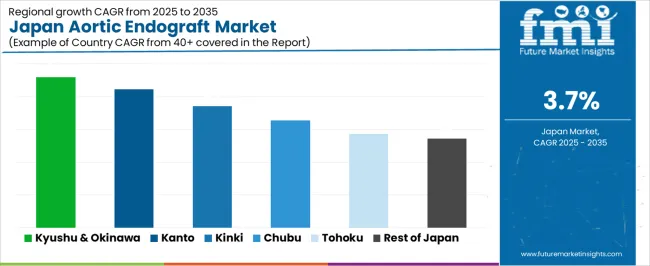
| Region | CAGR (%) |
|---|---|
| Kyushu & Okinawa | 4.6% |
| Kanto | 4.2% |
| Kinki | 3.7% |
| Chubu | 3.3% |
| Tohoku | 2.9% |
| Rest of Japan | 2.7% |
The demand for aortic endografts in Japan is steadily growing across all regions. Kyushu and Okinawa lead with a 4.6% CAGR, driven by rising healthcare access and increasing awareness of vascular diseases in the aging population. Kanto follows with a 4.2% growth, supported by advanced medical facilities and a high concentration of hospitals offering specialized treatment options. Kinki records 3.7%, influenced by its large healthcare infrastructure and the rising prevalence of cardiovascular diseases. Chubu grows at 3.3%, with steady adoption in regional healthcare centers. Tohoku experiences a 2.9% growth, and the rest of Japan records a 2.7% increase, reflecting ongoing demand for aortic endografts in smaller healthcare markets.
Kyushu & Okinawa is projected to grow at a CAGR of 4.6% through 2035 in demand for aortic endografts. The region’s advanced healthcare facilities, particularly in Fukuoka, are adopting minimally invasive procedures for aortic aneurysm repair. With an aging population and increasing prevalence of cardiovascular diseases, demand for endovascular interventions continues to rise. Hospitals and surgical centers in Kyushu & Okinawa are incorporating aortic endografts as a preferred alternative to open surgery due to their reduced recovery time and improved patient outcomes. The emphasis on advanced cardiovascular care further accelerates the adoption of these devices.
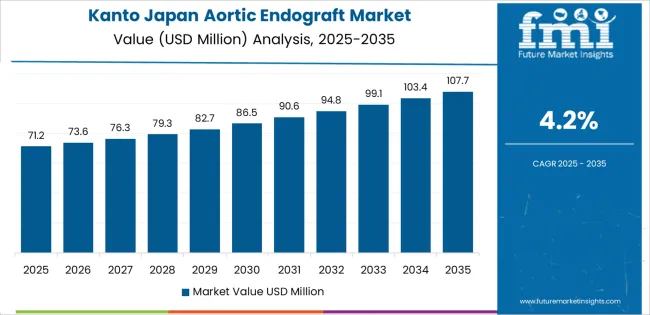
Kanto is projected to grow at a CAGR of 4.2% through 2035 in demand for aortic endografts. The region, including Tokyo, has a strong concentration of specialized cardiovascular centers and hospitals performing endovascular procedures. Rising cases of aortic aneurysms and peripheral artery disease contribute to the demand for aortic endografts. Healthcare providers in Kanto are increasingly relying on minimally invasive treatments to improve patient outcomes, reduce hospital stays, and optimize resource use. The adoption of advanced surgical technologies and devices further supports the growth of aortic endograft demand across the region.
Kinki is projected to grow at a CAGR of 3.7% through 2035 in demand for aortic endografts. The region’s hospitals and cardiovascular units, particularly in Osaka and Kyoto, are increasingly adopting endovascular repair techniques. As the elderly population grows, the prevalence of aortic aneurysms and other cardiovascular conditions rises, driving the need for advanced devices. Kinki’s focus on minimally invasive procedures, patient safety, and improved surgical outcomes accelerates the adoption of aortic endografts. The use of these devices allows healthcare providers to reduce complications and enhance recovery times for high-risk patients.
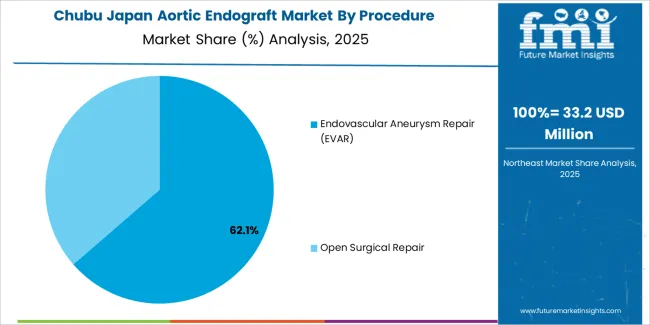
Chubu is projected to grow at a CAGR of 3.3% through 2035 in demand for aortic endografts. Healthcare centers in Nagoya and surrounding cities are adopting minimally invasive cardiovascular procedures, including aortic endograft implantation. The rising prevalence of cardiovascular diseases and a growing elderly population drives the need for advanced surgical devices. Chubu’s hospitals are increasingly integrating endografts into treatment protocols to reduce operative risk and improve recovery outcomes. The region’s focus on advanced cardiac care and the adoption of innovative medical devices further supports the growing demand for aortic endografts.
Tohoku is projected to grow at a CAGR of 2.9% through 2035 in demand for aortic endografts. Although less urbanized, the region’s hospitals are increasingly adopting endovascular repair solutions to address aortic aneurysms and related cardiovascular conditions. The aging population in Tohoku drives the need for minimally invasive devices to reduce surgical complications and recovery times. Regional healthcare providers are integrating aortic endografts into treatment protocols to improve patient care and optimize hospital resources. The region’s investment in cardiovascular care infrastructure supports steady growth in demand for endovascular devices.
The Rest of Japan is projected to grow at a CAGR of 2.7% through 2035 in demand for aortic endografts. Smaller cities and rural healthcare facilities are increasingly integrating endovascular repair solutions to treat aortic aneurysms and vascular diseases. With the aging population rising and cardiovascular diseases becoming more prevalent, the demand for minimally invasive surgical options grows steadily. The focus on improving surgical outcomes, reducing hospital stays, and enhancing patient safety supports the adoption of aortic endografts across these regions. Gradual modernization of healthcare facilities further contributes to market growth.
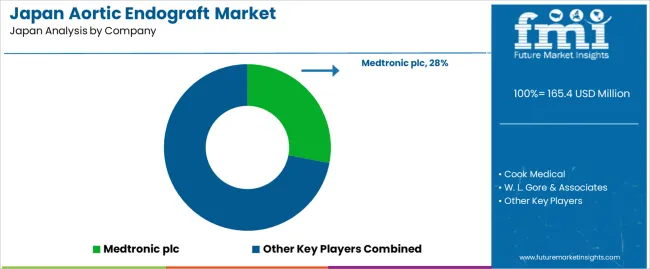
The demand for aortic endografts in Japan is primarily driven by the increasing prevalence of aortic aneurysms, particularly among the aging population. As the number of elderly individuals rises, there is a corresponding increase in cardiovascular diseases, including those affecting the aorta. The shift towards minimally invasive procedures over traditional open surgeries is also boosting demand for endografts, which offer lower risk, shorter recovery times, and less invasive alternatives. Furthermore, advancements in imaging and surgical techniques have improved the precision and success rates of aortic endograft procedures. The Japanese healthcare system’s focus on quality care and improved patient outcomes further drives the adoption of these devices.
Key players shaping the aortic endograft industry in Japan include Medtronic plc, Cook Medical, W.L. Gore & Associates, Terumo Corporation, and Endologix LLC. These companies offer a range of aortic endografts designed to treat both abdominal and thoracic aneurysms. Medtronic, Cook Medical, and Gore dominate the market with their well-established product portfolios and robust distribution networks. Terumo and Endologix are also competitive players, leveraging their strong presence in Japan’s healthcare system. Their continued focus on innovation, regulatory compliance, and effective clinical support helps shape the landscape of aortic endograft adoption in Japan’s medical sector.
| Items | Values |
|---|---|
| Quantitative Units (2025) | USD million |
| End Use | Hospitals, Ambulatory Surgical Centers |
| Product Types | Abdominal Aortic Graft, Thoracic Aortic Graft |
| Procedure Types | Endovascular Aneurysm Repair (EVAR), Open Surgical Repair |
| Materials | Metallic Endograft, Polymeric Endograft |
| Regions Covered | Kyushu & Okinawa, Kanto, Kinki, Chubu, Tohoku, Rest of Japan |
| Countries Covered | Japan |
| Key Companies Profiled | Medtronic plc, Cook Medical, W.L. Gore & Associates, Terumo Corporation, Endologix LLC |
| Additional Attributes | Dollar by sales across product types, procedure growth, regional dynamics, technological advancements, regulatory compliance, and healthcare trends influencing adoption in Japan |
The demand for aortic endograft in Japan is estimated to be valued at USD 165.4 million in 2025.
The market size for the aortic endograft in Japan is projected to reach USD 237.3 million by 2035.
The demand for aortic endograft in Japan is expected to grow at a 3.7% CAGR between 2025 and 2035.
The key product types in aortic endograft in Japan are abdominal aortic graft and thoracic aortic graft.
In terms of procedure, endovascular aneurysm repair (evar) segment is expected to command 64.5% share in the aortic endograft in Japan in 2025.






Our Research Products

The "Full Research Suite" delivers actionable market intel, deep dives on markets or technologies, so clients act faster, cut risk, and unlock growth.

The Leaderboard benchmarks and ranks top vendors, classifying them as Established Leaders, Leading Challengers, or Disruptors & Challengers.

Locates where complements amplify value and substitutes erode it, forecasting net impact by horizon

We deliver granular, decision-grade intel: market sizing, 5-year forecasts, pricing, adoption, usage, revenue, and operational KPIs—plus competitor tracking, regulation, and value chains—across 60 countries broadly.

Spot the shifts before they hit your P&L. We track inflection points, adoption curves, pricing moves, and ecosystem plays to show where demand is heading, why it is changing, and what to do next across high-growth markets and disruptive tech

Real-time reads of user behavior. We track shifting priorities, perceptions of today’s and next-gen services, and provider experience, then pace how fast tech moves from trial to adoption, blending buyer, consumer, and channel inputs with social signals (#WhySwitch, #UX).

Partner with our analyst team to build a custom report designed around your business priorities. From analysing market trends to assessing competitors or crafting bespoke datasets, we tailor insights to your needs.
Supplier Intelligence
Discovery & Profiling
Capacity & Footprint
Performance & Risk
Compliance & Governance
Commercial Readiness
Who Supplies Whom
Scorecards & Shortlists
Playbooks & Docs
Category Intelligence
Definition & Scope
Demand & Use Cases
Cost Drivers
Market Structure
Supply Chain Map
Trade & Policy
Operating Norms
Deliverables
Buyer Intelligence
Account Basics
Spend & Scope
Procurement Model
Vendor Requirements
Terms & Policies
Entry Strategy
Pain Points & Triggers
Outputs
Pricing Analysis
Benchmarks
Trends
Should-Cost
Indexation
Landed Cost
Commercial Terms
Deliverables
Brand Analysis
Positioning & Value Prop
Share & Presence
Customer Evidence
Go-to-Market
Digital & Reputation
Compliance & Trust
KPIs & Gaps
Outputs
Full Research Suite comprises of:
Market outlook & trends analysis
Interviews & case studies
Strategic recommendations
Vendor profiles & capabilities analysis
5-year forecasts
8 regions and 60+ country-level data splits
Market segment data splits
12 months of continuous data updates
DELIVERED AS:
PDF EXCEL ONLINE
Demand Signal Repository Solutions Market Size and Share Forecast Outlook 2025 to 2035
Demand Side Management Market Size and Share Forecast Outlook 2025 to 2035
Demand Response Market Analysis - Size, Share, and Forecast Outlook 2025 to 2035
North America Shipping Supplies Market Trends – Innovations & Growth 2024-2034
Demand of Kozani Saffron in Greece Analysis - Size, Share & Forecast 2025 to 2035
Demand of No-acid Whey Strained Dairy Processing Concepts in European Union Size and Share Forecast Outlook 2025 to 2035
Demand for Bronte Pistachio in Italy Analysis - Size, Share & Forecast 2025 to 2035
Demand and Trend Analysis of Gaming Monitor in Western Europe Size and Share Forecast Outlook 2025 to 2035
Demand and Trend Analysis of Gaming Monitor in Korea Size and Share Forecast Outlook 2025 to 2035
Demand and Trend Analysis of Gaming Monitor in Japan Size and Share Forecast Outlook 2025 to 2035
Glycine Soja (Soybean) Seed Extract Market Size and Share Forecast Outlook 2025 to 2035
Demand and Trend Analysis of Yeast in Japan - Size, Share, and Forecast Outlook 2025 to 2035
Demand of Pistachio-based desserts & ingredients in France Analysis - Size, Share & Forecast 2025 to 2035
Western Europe Men’s Skincare Market Analysis – Forecast 2023-2033
Demand and Trends Analysis of Stevia in Japan Size and Share Forecast Outlook 2025 to 2035
Japan Women’s Intimate Care Market Trends – Growth & Forecast 2024-2034
Demand and Trend Analysis of Fabric Stain Remover in Korea Size and Share Forecast Outlook 2025 to 2035
Demand and Sales Analysis of Paper Cup in Korea Size and Share Forecast Outlook 2025 to 2035
Demand and Sales Analysis of Paper Cup in Western Europe Size and Share Forecast Outlook 2025 to 2035
Demand of MFGM-enriched Powders & RTDs in European Union Size and Share Forecast Outlook 2025 to 2035

Thank you!
You will receive an email from our Business Development Manager. Please be sure to check your SPAM/JUNK folder too.
Chat With
MaRIA